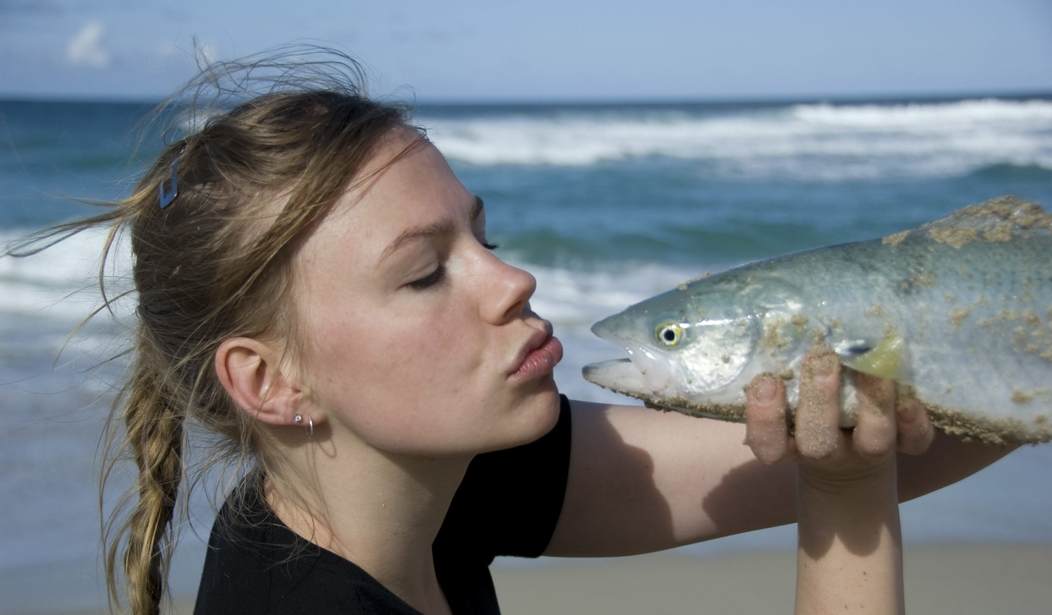Well, men, you had a good run, but women are into fish now. Sorry. “Some straight women have thrown their hands up in despair at the prospect of dealing with straight men,” writes Claire Fallon on HuffPost. And, I mean, who can blame them? These guys “grope us and talk down to us and consistently fail to clean the bathroom.” So, obviously, we can’t make “lives with them” or “let them touch us.” So, what’s a girl to do when all men are irredeemable pigs? Have sex with a fish. Duh.
Fallon’s article, called “Why Is Fish Sex So Hot Right Now? An Investigation,” is not a joke. She insists — based on the fact that she can name two stories about women falling for sea creatures — that there is a trend of stories about “fish-f***ing.” And that this “trend” (sorry but I always thought a trend had to include at least three) implies some sort of shift in the female consciousness away from men and toward… well… fish.
Fallon’s examples are, of course, Guillermo del Toro’s The Shape of Water, and a romance novel called The Pisces about a woman who falls in love with a merman (though Fallon is quick to inform us that the man-fish still has human male plumbing, which the book apparently describes in graphic detail). And these two stories — one of which most of us have never heard of — are indicative of women’s desire to escape the “world of marauding straight men” and take refuge under the sea.
Putting aside, for a moment, how ridiculous it is to assert that these two stories represent a trend, it’s worth noting that the trope of women falling in love with (or feeling connected to) monsters has been around for a long time. Beauty and the Beast is the obvious example, but there’s also The Phantom of the Opera, any book or movie with a vampire (think Twilight), and The Creature from the Black Lagoon, to name a few. And when a woman falls in love with a monster — as they do in these myriad stories — the monster’s monstrousness almost always represents exactly the opposite of what Fallon asserts.
As Anthony Lane puts it in an article for The New Yorker, “the scent of sex” is all over Beauty and the Beast. Monsters (well, some monsters anyway) are sexy because they represent the raw, unchecked sexual energy of men. “The half-buried truth about Disney’s ‘Beauty and the Beast,’” writes Jia Tolentino, also in The New Yorker, “is that, in the end, the prince is a letdown.” The pure masculine vitality that Fallon thinks is pushing women away from men is exactly what the monster’s monstrousness represents — and that is what draws the woman to him, even in his ugliness.
“So many straight men… are bad to and for us,” Fallon writes. “Why would we take the enormous risk of loving one of them?” But that’s exactly what happens in Beauty and the Beast and all the other monster love stories. The woman is drawn to the man’s raw sexual energy and, in loving him, allows him to harness that energy to become someone worthy of her love. She takes the “enormous risk” of loving the beast and the beast becomes a man. It turns out it was a risk worth taking. The sexual aspect of a monster love story is not an alternative to heterosexual sexual attraction, it’s a direct representation of it in its most unadulterated form.
Fish men, Fallon asserts, lack “the exhausting baggage of male entitlement” and they help women to deal with the fact that they “do have desires,” even if they don’t want the hassle of interacting with those icky men. But I’d like to offer an alternative theory. What if — instead of women feeling that they just can’t deal with men any longer — women are actually feeling the effects of the feminist insistence that men must stop acting like men?
Women falling in love with monsters is a well-established trope. If we give Fallon the benefit of the doubt and assume that this kind of story is on the rise, it stands to reason that the symbolism that has always been inherent in monster love stories — the draw of the male sex drive — still applies. And if — at the insistence of feminists like Fallon — men have stopped acting like men lest they be lumped in with perpetrators of sexual assault, I would argue that women’s renewed interest in monster love stories would imply a desire to seek out the sexual male energy that feminists have stifled.
The fact that I have to point out that straight women are, in fact, attracted to straight men causes me to despair for society as a whole. Of course, Fallon hasn’t successfully identified a trend. So, perhaps, the only thing her article actually points to is her own strange interest in fish sex. To which I say: whatever floats her boat.









Join the conversation as a VIP Member